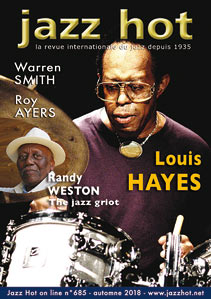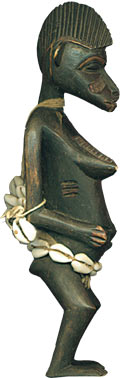

Randy Weston
When an important jazz musician such as Randy Weston dies, sadness is not enough to explain the feelings of emptiness, loss. Despite the albums, the films, the books, the interviews, there is such an «oral» and physical dimension to the character, such presence, in the music as in the philosophical and cultural message, we keep this impression of a catastrophe in the collective sense. Everybody knows this analogy made, for the African memory, between the Ancients and the libraries of our western world. And for Randy Weston, this is particularly true, even if he wasn't African but American of African descent because jazz has conserved this ancestry to be a people’s culture, the oral tradition.
On the occasion of Randy Weston's departure, many have dwelled on such and such a trait of the man's character, his kindness, on his artistic dimension, on his qualities as a citizen of the world, and, in fact, he is so rich with the most diverse qualities that we are not short of material. But the media's dispersion of these tributes and their «obligatory» character, partial, superficial or twisted by conformity and prevailing egotistical thought, also by a form of negation, harms or deforms the complexity and the depth of Randy Weston, whom we cannot distinguish the man from the citizen, from the artist. This is true of all artists when we take the trouble to analyse their biographies, but it is especially evident in Randy Weston who put at the heart of his multidimensional action to simply be a man in his own right.
This is why, for such an artist, such a man, we have, Jazz Hot has, broken with the traditional biographical and discographic reminder –this already exists in the review– to privilege a collective tribute. It has taken an unusual magnitude, and an overall unexpected form, often stories, as in the oral tradition, like Randy Weston himself, master storyteller, where each recalls the departed not to recount more or less sincere banalities but to speak of the man. This juxtaposition of narratives reconstitutes the density and breadth of an engaged man-artist-citizen who, despite his fame, has always kept a simplicity in life and a manner that was very jazz, and deep down very working class, without all the artifice and hysteria perverting most manifestations these days, jazz included, under the cartloads of society events and conformities more in tune with the universe of the mass media and show business than with the spirit of jazz full of humanity.
What's more, this juxtaposition of the points of view, from Master Gnawa to a young musician, in passing through all that jazz has the great artists, known and lesser known, allows leave from platitudes, a propagandist jumble that invades the «official» discourse concerning Randy Weston, because he lived in Marocco, because he made references to Africa during his life, because he recorded with Gnawa musicians, even other countries and other origins.
In fact, the main interest in uniting these tributes is to highlight the guiding principal of the thought and the art of a man, in other words, to be more modest, the end of a ball of yarn that has wound around with patience, perseverance, and rationality, Randy Weston all along his career of 70 years. Born into a family where the fight for equality was of primary value, born into jazz, and having benefited from the deep roots of his elders from this working-class culture of emancipation –in the segregated society of inequality in the United States, despite a period of democratic conquests not without resistance (the first half of the 20th century), a culture that has framed and nourished his artistic and human evolution–, he was anxious to transmit the legacy of struggle and values, to bring his contribution to all Africans, of birth or extraction, for the accomplishment of this dream of equality and dignity that his father taught him.
In all of these tributes, one of the most lucid and explanatory of Randy Weston's work, in its entirety, is that of a Master Gnawa. El Gourd recounts, in a moving way and without artifice, the meaning of Randy Weston's art for the Gwana of Marocco: intuitive ethnomusicological work from Randy Weston, promoter for the love of art, similar to Charles Delaunay, without an external, cold and dead dimension from academic discourse, but with the warm solidarity of the mission of a social and cultural worker, from the artist who is involved and takes daily risks, of all sorts, to gain, in the sole interest of the Gnawa, the recognition of a people’s expression, that of the Gnawa, a population enslaved in Marocco in 1591 (see the very detailed book of The Splendid Master Gnawa Musicians of Morocco, feat. Randy Weston), living in Marocco in a segregated community for centuries as a servant class, by the sole reality of their sub-Saharan African origin and the phantasm of their colour. The parallel between the situation of Afro-Americans in the United States and that of the Gnawa in Marocco could have, must have thrown light onto a large part of Randy Weston's thoughts. Like Randy Weston's permanent evocation of the paternal message: «Don't forget Africa, Son!». Like the production of the album by the Masters Gnawa, where Randy is only a guest, very discreet and modest. Like this essential tribute from El Gourd who speaks with lucidity the benefit of Randy to Afro-American music, and of his essential help in the recognition of the Gnawa culture. Like the art of Randy Weston, itself, jazz from the first to the last note, from the first to the last word, because his words, his voice are an inseparable part of it.
No, Randy Weston does not make world music, this category of mass consumer products; he is a universal artist in his expression because he is a man from the culture of jazz, universal. As such, he is also respectful of the expressions of other peoples, in their authenticity, their integrity and their diversity, not only that of the Gnawa, even if in this configuration, in Marocco he found a way to transpose a part of the paternal and jazz message to contribute to the universal recognition of the African, and therefore Marocco, like jazz has contributed to the universal recognition of the Afro-American, and therefore the United States of America. This acknowledgment has also come from outside, from France first, and not by chance, we have already spoken to you about it often.
El Gourd and Randy may have spoken Spanish to understand each other, because we learn from Danilo Pérez that Randy Weston, in Panama, himself searched with obstinacy for his local family roots, those of his Ancestors: the conscience of a man in his own right, carrier of a memory, with roots and a narrative that exceeds the limits of an existence, that of a long journey, from Africa towards Panama then towards the United States.
One more thread in the billions of threads that Randy Weston has woven in the United States followed by the world to regain his dignity as a man, not only for himself, but for the community of man, of all geographical origins, because for him, as for Martin Luther King and other revolutionaries of centuries past, equality, solidarity and dignity are the only solutions for the human race, a unique species that some predators seek to divide for their own profit; in general, this is also the law within the animal kingdom –of which humans are a part of– but with less perversity and tools of domination amongst animal species.

Of these billions of threads, only Randy Weston mastered them because he constructed all of the architecture himself, the coherence, and if he voluntarily speaks of it, it was already necessary to a sensitive, curious and imaginative audience to understand the general logic, perhaps hoping for awareness. In fact, Randy Weston's message is far more decisive, strong, elaborate and complex than what is said of it or is revealed by its great modesty. It is not consensual even when it is said with the most beautiful smile in the world, with the most beautiful music, and with the greatest simplicity and attention towards other human beings. The introduction to his autobiography places the framework and the tone, without concession on the fact that one man is equal to another, that a woman is equal to a man. We are still very far from these simple ideas. Curiously, because society does not prepare for it, El Gourd also mentions this dimension for the search of equality between the sexes under the impetus of Randy Weston who never failed to mention the work of Melba Liston, the great trombonist and arranger, to make known his work on the equality of his male peers.
When Randy Weston departed, it is all this complexity of thought, so exacting, this consciousness that disappeared, it is a maturation of a century of life, of a century of jazz, founded on the centuries of human history, that has vanished, and it is the power of the messenger's presence and voice, a sage in the ancient sense, sure of his art, sure of his references, who returns to nothingness. The image of the uprooted baobab tree used in the tributes is evocative of this.
For our amnesic and disintegrated world of the 21st century, with so little democracy despite the propaganda, the disappearance of Randy Weston, even at his age, is, therefore, a catastrophe, despite its ineluctable aspect, and first of all because few are conscious of this, even amongst jazz fans, despite the efforts of a great Master of jazz piano, of a great artist, expressing himself for two hours without any interruption of applauds to keep his narrative intense, coherent, punctuating his resonant arabesques –some pure jazz of Brooklyn, inspired by the whole world like his fathers in jazz– by the long intimist private conversations, addressed to each of us to explain with his words, by his voice where his inspiration came from –his genius from our point of view– with a clarity, a lucidity, a modesty and a smile that we already miss.
PS: a thought for Fatoumata Weston
Yves Sportis Translation by Sandra Miley
Front cover: Louis Hayes © David Sinclair
Detail insertion: Randy Weston © Pascal Kober
© Jazz Hot n°685, autumn 2018
|

